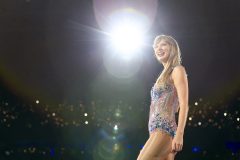This article originally appeared in the April 1996 issue of SPIN.
In hip-hop’s cosmology, “hardcore” rap means a cantankerous MC kicking rhymes like bodies over harsh, skeletal beats. “Alternative,” on the other hand—singing, melodies, instrumentation, any sort of peace-and-love attitude—translates as “no skills.” So hip-hop trio the Fugees—Wyclef “Clef” Jean, Lauryn “L” Hill, and Prakazrel “Pras” Michel—aren’t at all pleased to be in this section.
“We are a hip-hop group, point blank,” says 20-year-old Hill, a doe-eyed gamine of startling beauty and as brawny and nimble a rapper as she is a rapturous soul singer. “‘Alternative’ is like saying ‘she’s attractive for a dark-skinned girl,’ a backhanded compliment. Just because we can play instruments, we can’t be real hip-hop? The reason I make the kind of music I make is to bring musicality back to the ghetto. It’s about being creative, and sometimes adding a motherfucker if it means getting my point across.”
The Fugees titled their sophomore effort The Score because it settles that issue the best way possible, with moody spaghetti-Western riffs, noodling jazz horns, R&B memories, Jamaican rude-boyisms, a radical reinvention of Roberta Flack’s “Killing Me Softly With His Song,” and the Refugee Camp’s own live instrumentation. The Score leads off with “Red Intro,” a street-corner poetry rant from Ras Baraka, son of poet Amiri Baraka. A flowing edit takes us to the Fugees, smoked out and ripping lyrics back and forth to sound an old-school battle cry. “I used to be underrated / Now I take iron / Makes my shit constipated / I’m more concentrated,” raps Hill.
“That gangsta shit is B.S.,” says Jean, the group’s live wire guitar hero and at 26 the oldest. “The real thugs and gangsters got the rappers saying that shit. The gangster to me is the guy who owns Sony [the Fugees’ label], the guy who owns SPIN, the guy who owns MTV. Hardcore is like being in the house with the eight of us, mom on welfare. That’s what I call hardcore. I don’t mean to sound preachy ’cause we’re a bug-out group.” “Hardcore for hard times,” says Hill more succinctly.
The trio met eight years ago at Columbia High School in South Orange, New Jersey, when Hill entered her freshman year. Haitian-American Michel, a junior and the son of a church deacon, asked her to sing on his rap tracks. They were joined by his older cousin Jean, a self-taught musical prodigy, himself the son of a fire-and-brimstone preacher who hated Jean’s “devil’s music” and once refused to sign a label contract his then-underage son was offered. In a gesture of proud defiance, they named themselves the Fugees for the Haitian refugees who were then washing up on U.S. shores.
Except for Salaam Remi’s straight-up hip-hop remix of “Nappy Heads,” the Fugees’ 1993 Blunted on Reality debut pleased music critics and confused radio programmers and hip-hop purists. No wonder: Jean cites as influences an eclectic mix ranging from Eek-a-Mouse and Peter Tosh to B.B. King, Thelonious Monk, and even the Pet Shop Boys and Yes. The classic-R&B-loving Hill, who worked as a teen cabaret singer and theater actress, today studies history at Columbia University. “In class, I’m always like ‘hey, does anyone else notice that this is the same shit that made it so conquest and subjugation was the basis upon which America and the West was built?’ You know what I’m saying? It’s always Machiavelli, Hobbes, Locke.”

As the album flopped, Hill’s featured appearance in Sister Act II inspired suggestions that she take up the mic solo. “I don’t find it a compliment when people say that,” Hill says heatedly. “These brothers are like members of my family. Families sing together and they blend. There’s something that we do together that makes perfect chemistry. It’s been perfect since I was 14 years old.” Jean raps his response in The Score‘s “Zealots”: “The magazine says the girl shoulda went solo / The guys should stop rapping vanish like Menudo / Took it to the heart / But every actor plays his part. / As long as someone was listenin’ / I knew it was a start.”
This time around, the Fugees produced the album themselves, creating the same impromptu spirit in their New Jersey Booga Basement Studio that they have in their dynamic live act, a revamp of an old-time soul revue that’s one of the best shows in hip-hop. Steering clear of “A” audiences, they’ve been playing to the hip-hop heads in the hoods, the “hardcore audiences, blunt smokers, weed smokers, gun toters, like kids on our block who we grew up with,” says Jean. “I can hold my guitar or sing, but it’s with a rebel voice.”
Their efforts seem to be paying off. In late December 1995, the Fugees won “The Battle of the Beats” on Hot 97 (a New York City hip-hop radio station) five nights in a row with The Score‘s “How Many Mics,” defeating the Wu-Tang Clan and “whatever is so-called hip-hop today,” says bass-voiced Michel, a tall, lanky 23-year-old not easily impressed. “Hip-hop is a culture—dance, lingo, style, music—and that’s what the Fugees is. Anyone can rap.”





